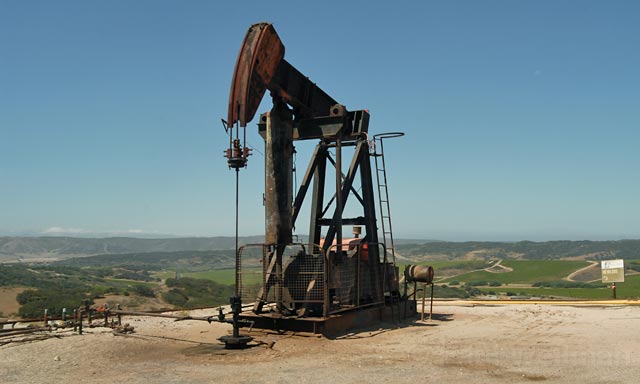Supes Chew on Oil Tax
Opponents Criticize Potential Duty on Crude Production

Mirroring an endeavor it cut off in 2008, Santa Barbara County is once again eyeing a potential tax on crude-oil production in an effort to generate what is expected to be millions of dollars in annual revenue. The tax, which county staff estimates could bring in between $1.8 million and $3.3 million a year, would have to go to the voters for approval, however. If it does make it on the ballot, it wouldn’t be until November 2012.
The Board of Supervisors was presented with the idea Tuesday in the context of the county’s deep budgetary issues during the last few years. Dennis Bozanich from the County Executive Officer’s office outlined many of the recent financial struggles, noting last year’s $72-million deficit and how the supervisors have unfunded 600 county government positions since 2007-2008.
It was in 2008 that the county considered placing a similar tax on the ballot, with the supervisors eventually deciding against it because Measure A — a transportation sales tax on the verge of ending — was also going on the ballot.
There’s still plenty of time — the county has until July 5 to figure out whether to place the item on the ballot — but still plenty to be worked out. Complicating things is outright opposition from groups like the Santa Barbara County Taxpayers Association and the California Independent Petroleum Association (CIPA), an organization that represents hundreds of oil and natural-gas producers in the state.
Blair Knox, the director of public affairs for CIPA, said difficult times are ahead for the proposal if the board decides to move forward. “CIPA has a perfect record of defeating every severance tax we’ve opposed over the last 10 years,” he said. “CIPA has a strong campaign team in place and resources to contest the tax initiative.”
And then there is a potential statewide proposition that would impose a 15-percent tax on the value of each barrel of oil extracted, with the revenue going to fund education. For that to make the ballot, 700,000 signatures must be submitted, and those signatures are currently being reviewed. In 2006, county residents — falling in step with voters statewide — rejected Proposition 87, an initiative that would have created a tax on oil extracted in California. Non-oil-related tax measures are being considered in the cities of Santa Maria and Carpinteria, as well, which could have an impact on citizens in those communities voting to approve a countywide measure.
While there is strong opposition to the tax in general, there was particular resistance to the county spending money to survey the public to gauge interest, a move the five supervisors decided against on Tuesday. Polling has already been done by the Santa Barbara Taxpayers Association, which hired a Washington, D.C., firm to survey 500 likely voters. The poll showed 45 percent of people would support an oil tax that would go toward the county’s General Fund. Such a tax would only need 50 percent plus one vote to win.
When given options for specific programs, that threshold increases to 66 percent of the vote plus one. Of potential voters, 59 percent said they would support the tax if it went toward schools, while 50 percent would support it going to firefighters, and only 37 percent favored funding a new jail.
Some people opposed to the measure said property tax values could go down as a result of a tax on oil still in the ground. That, in turn, could have an effect on funding for schools and special districts, which receive a lot of their money from property tax. But Auditor-Controller Bob Geis questioned whether that was true. Additionally, Bozanich noted that out of a total property tax roll of roughly $662 million in total assessed value, those properties associated with oil and gas production make up $12.1 million, or only 1.8 percent, of the roll. Roughly half of that amount is in just two facilities.
Linda Krop, chief counsel for the Environmental Defense Center, cautioned that, while the environmental community understands the need for the county to increase revenue, doing so in the oil industry could encourage and incentivize increased production. She asked the supervisors to look at a tax that would only apply to existing oil production.
Others, however, like Joe Armendariz, executive director of the Taxpayers Association and a Carpinteria city councilmember, think the oil industry is already over-taxed and that the measure won’t fly with voters. “The bottom line is this proposal is a loser,” he said.
But the supervisors, on a split vote (with Steve Lavagnino and Joni Gray dissenting), decided to move forward and have county staff gather more specifics on what a tax measure would mean for the county, with the hope that such a tax would open up revenue to restore services to the public. “This is an item I believe our county is ready to talk about seriously,” said 2nd District Supervisor Janet Wolf, who, along with the board majority, said this was but one way to potentially generate revenue for the county.



